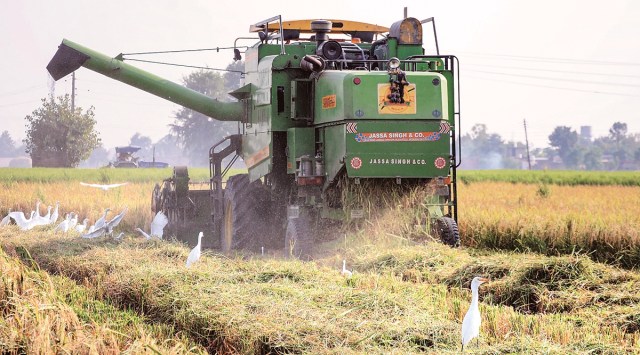Punjab fast turning into junkyard of stubble management machinery: Experts
Agriculture expert Devinder Sharma was speaking during the release a report — 'Beyond Stubble Burning-Providing farmers' perspective on the challenges faced in reducing stubble burning' — in Chandigarh.
 Mechanisation, advanced irrigation techniques, and hybrid crop varieties have led to monocultures of rice and wheat. (Express File Photo)
Mechanisation, advanced irrigation techniques, and hybrid crop varieties have led to monocultures of rice and wheat. (Express File Photo) Punjab is fast developing into a junkyard of stubble management machinery with the state already having 1.17 lakh such machines and another 20,000 to be added this year, a noted agriculture expert Tuesday said, adding that crop residue management needs a sustainable solution.
Agriculture expert Devinder Sharma was speaking during the release a report — ‘Beyond Stubble Burning-Providing farmers’ perspective on the challenges faced in reducing stubble burning’ — in Chandigarh.
To prepare the report, Asar Social Impact Advisors collaborated with researchers, Clean Air Punjab (a network of citizens, civil society organisation members, professionals and other key stakeholders), and CMSR Consultants Private Limited.
Sharma said that a sustainable and permanent solution was the need of the hour. He said a special budget allocation for the farming community was the need of the hour. He said the report recommends a multi-pronged approach that includes financial incentives, technical assistance and awareness campaigns. It proposes hassle-free subsidies for mechanised equipment that facilitates residue management, thereby reducing the need for burning.
The report also suggests collaboration between government agencies, agricultural experts and farmers to promote knowledge sharing and implementation of sustainable practices.
Attending the event, progressive farmer Palwinder Singh of Fatehgarh Sahib expressed satisfaction over the approach of the report. He said farmers also want to protect the environment, but it is important that solutions consider their economic realities. “The report takes into account our challenges and offers practical solutions that are in line with our interests,” he said.
Dr Prabhjyot Kaur, Principal Scientist, Agrometeorology, Punjab Agricultural University, said, “As a leading scientist, I am guided by the winds of change. Through science and sustainable practices, we can create a blue, bright and clean Punjab for future generations,” she said.
Gurpreet Singh from Punjab Development Forum said, “In our search for permanent solutions to stubble burning, let us be united in the spirit of cooperation and support, recognising that solutions exist beyond blame”.
Supreet Kaur, president of EcoSikh and member of Clean Air Punjab, said that the strength of our efforts lies in the collective will of our civil society.
The report
The report states that Punjab’s struggle with pollution highlighted the unintended consequences of well-meaning policies. The Punjab Preservation of Sub-Soil Water Act, 2009, which was aimed at protecting dwindling groundwater by delaying harvesting, narrowed the window that farmers had before the wheat harvest, which in turn increased stubble burning.
Mechanisation, advanced irrigation techniques, and hybrid crop varieties have led to monocultures of rice and wheat. The lack of successful procurement models for alternate crops and challenges in the supply chain discourages diversification. Financial viability and lack of support further hinder participation.
Policies that recognise the potential of utilising paddy straw for power generation and biofuels have faced challenges. Combine harvesters have made straw collection difficult. The lack of storage facilities and high transportation costs burden farmers and biomass power plants.
Effective crop residue management schemes were introduced, but farmers face challenges with implementation. Insufficient horsepower of tractors, limited usage periods, machine malfunctions, and low productivity contribute to traditional methods and crop burning. Standardised rental rates and comprehensive support are needed for successful implementation.
Harvesting and sowing during the festive season have also created a labour shortage. Mechanization has reduced the need for manual labour, and alternative employment opportunities have decreased seasonal migration. This has made it challenging to manage crop residue and implement diversification programs. Innovative solutions are needed to address labour shortages, promote crop diversification, and ensure effective residue management.







